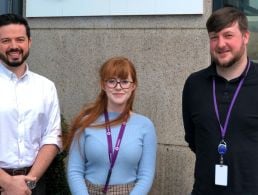Janet Phan is a tech leader at PwC and founder of nonprofit Thriving Elements. Here, she explains why good mentors are invaluable to disadvantaged communities.
As the daughter of Vietnamese refugees, Janet Phan is certain she wouldn’t be working in tech today without the guidance of mentors along her career path.
Now, Phan is an EMEA technology programme leader at PwC, based in Switzerland. She is also the founder of Thriving Elements, a nonprofit specialising in mentorship for girls from disadvantaged communities.
‘Mentors can make all the difference in a mentee’s life. They sure did for mine’
– JANET PHAN
Why do you think women from disadvantaged communities often excluded from the tech industry?
Education lays a foundation for vibrant lives for girls and women, their families and their communities. Communities in need lack the access to quality education and resources, such as reliable and affordable broadband and devices to connect to the internet.
Refugees have the challenge of adapting to a new environment, including culture and language barriers. They may come with a good education in their home country, but it is not recognised in their new country, and thus they are forced to take a job far below their skillset.
A culture still exists that encourages women to stay at home to take care of their partners and children. In addition to communities in need, in a thriving country like Switzerland, expensive childcare results in women staying at home. Those who live in poverty are at risk of not reaching their full potential because their priority is survival.
For a woman who wants to get into tech, this could be near impossible if she isn’t set up for success financially, educationally or without a mentor to guide her. Without mentors creating access and opportunities for me, I wouldn’t have reached mine.
What do you see as the major barriers when it comes to women from disadvantaged communities getting into tech?
We need more mentors. From my experience of being in this industry, the one thing that has really stuck out to me is that oftentimes I am the only female at the table.
Women are grossly underrepresented in key leadership and managerial positions within the industry. We need those in those positions now to lead and mentor the next generation. Sometimes it takes just that one moment or that one person to help someone see what they are capable of and go beyond their potential.
I’ve also observed from time to time junior to mid-level male counterparts who are also trying to reach leadership positions or get that next promotion not being supportive of their female counterparts’ growth, since they are looking out for themselves.
We need more male allies to help with sharing with leadership about their team members’ impact and achievements, especially those who are underrepresented. In some cases, people who have risen from communities in need, we feel so thankful to have the opportunity to be where we’re at that we don’t necessarily push the grain as to avoid conflicts.
What steps can we take and what resources will we need to address this?
We need our women leaders in technology to shift the narrative that technology is computer programming or coding. Computer programming is just one facet of the field. Technology encompasses a breadth of areas. If more girls and women understood how many STEM careers were available to them beyond coding, the number of women in tech would increase.
We need creative designers to make digital interfaces attractive and user friendly. We need auditors and detail-oriented personalities to ensure compliance with local country regulations. We need those who love programming and project management to be the glue that brings a successful technology or engineering programme together.
We need to change the narrative to expand our audience and message. We need more inclusivity of the diverse personalities and skillsets needed in order for technology to be impactful.
My ask is that leaders, educators and anyone in the sphere of influencing the next generation of women in technology expand the scope of messaging. We need to shift from the idea that technology and engineering is computer programming to the message that technology is for everyone, and the industry needs what you have to bring to the table, whatever that may be.
We lose out on a lot of incredible STEM talent when the barrier is so high.
What makes for a good mentor, do you think?
Encouragement and empowerment are important. Some of the most powerful advice I’ve ever received from a mentor was, ‘The worst thing they can tell you is no. What do you have to lose when you try?’
As a mentor, the role isn’t to instruct; it’s to encourage and empower. Great mentors also share their thought process on the decisions they’ve made along their career paths. More importantly, they share their failures and what they learned from them. Transparency and authenticity can help mentees make these difficult decisions as they face them later in their career.
Mentees may feel too intimidated to share some of their challenges or worry that it will make them seem unqualified. This is why it’s also important the mentor gets to know the mentee on a personal level. It’s crucial to understand what they need help with and what drives them.
Lastly, mentoring isn’t one-sided. For the relationship to be rewarding to the mentor, it’s important they find a mentee who’s willing to take advantage of access to the knowledge, experience and time the mentor can offer.
What impact can a good mentor have on a mentee’s career?
My life has been changed by my mentors. I am the daughter of Vietnamese refugees, and I quickly learned my parents would not be able to guide me to where I needed to go, whether educationally or financially, to achieve my goals.
I spent my summers working 12-hour shifts at KFC, with a night shift at Hollywood Video, to save for a car and tuition. I met my first mentor in high school, before I had a name for what he was. I was dropping out of a business competition that would have required me to travel across the state. With a phone call, he was able to bring my parents around and I ended up participating.
For the first time, I realised that there could be ‘guides’ along my way. If I was willing to do the hard work, they could open doors, increase access and help me navigate the system.
The series of mentors that I’ve had since – mentors who guided me through college, the start of my career and my role today as a global technology consultant for a major consulting firm – were so impactful on my life that in 2016, I founded a global nonprofit, Thriving Elements, that matches girls in underserved communities with long-term STEM field mentors.
So yes, mentors can make all the difference in a mentee’s life. They sure did for mine.
Is current STEM mentorship lacking? How can we fix that?
Yes. I believe there are three key reasons why and how we can fix it. The first is that people are not sure how to be a mentor.
The second is that the mentoring programmes that exist are often an add-on to the core competency or vision of a nonprofit organisation. Or someone is running it on the side of their desk in a for-profit organisation with no proper funding or resources.
To fix this, nonprofits should partner with mentoring programmes where mentoring is their core competency.
The third is that mentoring programmes – either those run by nonprofit or for-profit organisations – are fixated on the number of mentor and mentee pairs they can match up and lack proper guidance to mentors and mentees. I believe mentor-mentee matches should not be run like a supply chain. It is a two-way street that must be driven by the mentee.




